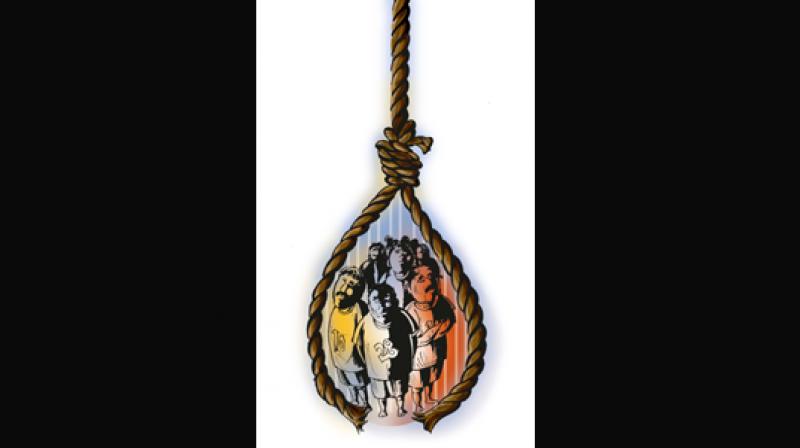Noose for rapists

Chennai: While the Delhi HC pulled up the Centre for its hasty decision in the wake of the Kathua, Surat and Unnao rape cases to bring in an ordinance for an amendment to the Pocso (Prevention of Children from Sexual Offences) Act, thereby allowing judges to award the death penalty to those convicted of raping a child below 12 years of age, activists and lawyers expressed doubts about the rationale behind the amendment.
As to whether imposing a punishment as harsh as the death penalty will actually act as a deterrent, human rights activist Pranitha Timothy, who otherwise heartily welcomes government's move to increase the minimum punishment in rape cases for various age groups, strongly believes that it is the system that needs to be corrected first. “We live in a dysfunctional system. There are several loopholes in the system itself. In such circumstances, a harsher law might bring negative consequences upon the victim,” she asserts, adding that a law for victim protection is the need of the hour.
K. Subhashini Suresh, head, Civil Litigation/ ADR, Chennai Law Associates, says that the amendment will help create some deterrence. “At least there will be some fear working in the head of potential offenders. They will think twice before committing such offences. Inhuman behaviour cannot be tackled in a better way,” she asserts. She does not agree to the idea of age-based gravity of punishment. “Why only 12 years? Even a 16-year-old is not physically strong enough to fathom or resist the perpetrator.”
As to juveniles getting acquitted or given lighter sentences even in the most dreadful cases (2012 Delhi case), Subhashini is of the opinion that even juveniles should be strongly penalized. “He had full knowledge of what he was doing/ the nature of the act he was indulging in at that moment,” she points out.
Pranitha disagrees. “People do fear imprisonment to some extent but again the system itself is dysfunctional and the new law can be misused. It is not wrong to reason that the offender will try to wipe off the evidence. It should also be ensured that there is no interference in the investigation process. The problem starts at the very FIR stage itself. Power politics should not be allowed to come into play. It is high time that we stop giving religious / political hues to sensitive matters like rape.”
While many are happy about the call for forensic labs on the police station premises , Pranitha postulates that the first step should definitely be building up trust and credibility as there is a general skepticism about policemen. Veering onto the announcement to create new posts of public prosecutors, she suggests that attention should first be paid to fill the existing positions.
She quotes a victim, “How we dread entering police stations and hospitals, but we will, if we know they will not harass or rape us.” This is one of the points in a note prepared by her organisation, Justice and Hope .
Apart from the general concern raised over the death penalty, speeding up the investigation, that is, fixing a time frame of two months, has also invited criticism. According to advocate Meera Gupta, senior consultant, Chennai Law Associates, this is not a wise decision as the limited time-frame may lead to wrongful imprisonment due to lack of convincing evidence.
Referring to government's sudden decision to allow judges to give the death penalty, advocate Kanimozhi Mathi opines that instead of coming up with new amendments, the existing provisions/ laws should be effectively implemented first. She also stresses upon the need for co-existence of social welfare centers alongside police stations. She approves of the death penalty as according to her, “rape cannot be pardoned as it takes away the modesty/ dignity of the woman.”
With respect to the already very low conviction rate in child rape cases (not even 30 per cent as per the latest NCRB data) and the argument that the death penalty might defer reportage to police if the rape accused belongs to the victim's family, advocate Subhashini emphasises the need to convince children to open up and not suppress anything.
Although questions are being raised nationally about the rationale employed behind the amendment, youth echo the same sentiment of professionals.
According to Divya Narayanan, a fresh graduate, there is absolutely no logic behind fixing the victim's age limit for possibility of a death penalty. “Isn't a 30-year-old a woman?” Divya throws up a valid question.
On the other hand, C. Tanushree, a second year student of journalism, this amendment should have come well before. “Had it been brought right after the 2012 Delhi gangrape case, today the 8-year-old in Kashmir would have remained alive,” she rues, stressing upon the importance of sex education in schools.
“The age limit can be extended to the age of 18. Parents should also encourage their child to stand up against the perpetrator. A rapist deserves to be hanged,” said A.R. Swathi, a student.

